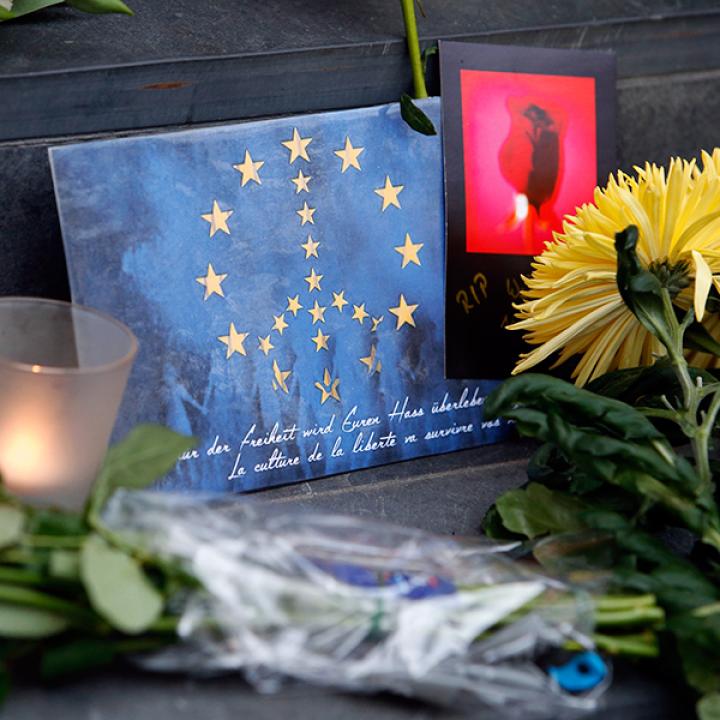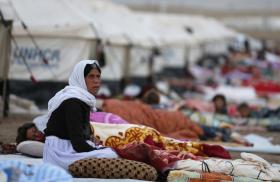
- Policy Analysis
- PolicyWatch 2598
Terror in Europe: Combating Foreign Fighters and Homegrown Networks

Part of a series: Counterterrorism Lecture Series
or see Part 1: U.S. Efforts against Terrorism Financing: A View from the Private Sector
Current and former officials from the United States and Europe examine next steps for counterterrorism efforts after the Brussels attacks.
On March 25, Matthew Levitt, Olivier Decottignies, and Eric Rosand addressed a Policy Forum at The Washington Institute. Levitt is the Institute's Fromer-Wexler Fellow and director of its Stein Program on Counterterrorism and Intelligence. Decottignies is a diplomat-in-residence at the Institute and a member of the French Foreign Ministry. Rosand directs "The Prevention Project: Organizing Against Violent Extremism," based at the Global Center on Cooperative Security; he served until recently as counselor to the undersecretary of state for civilian security, democracy, and human rights. The following is a rapporteur's summary of their remarks.
MATTHEW LEVITT
After the tragic terrorist attacks in Brussels, Europe as a whole and Belgium in particular are facing a twofold problem. First, there is much work to be done from the counterterrorism perspective. The fact that Brussels plotter Salah Abdeslam was able to hide out in his hometown since the November attacks in Paris is a concern. Many EU member states are not yet connected to the information-sharing databases that Europol has put in place. According to Europol, around 5,000 EU citizens have traveled to warzones in Syria and Iraq, yet only 2,786 foreign terrorist fighters (FTFs) have been recorded in its database. Worse, over 90 percent of these reported fighters came from just five member states. The EU must integrate intelligence sharing more fully among all of its members.
The second problem is social integration. Many of the people who join the Islamic State (IS) feel like they have gone from "zero to hero" -- for them, embracing an ideology and being a part of a group as it grows is an extremely empowering experience. The large Muslim community in the Molenbeek district of Brussels has become so isolated that their children do not attend school or speak the local language; similarly, only 8 of 114 imams in the entire capital speak any of the local languages. Molenbeek is also the second-poorest municipality in the country, with the second-youngest population, high unemployment and crime rates, and a nearly 10 percent annual population turnover.
While the Brussels attacks were a wakeup call for the rest of the world, the turning point for European counterterrorism officials was actually the thwarting of a terrorist cell in Verviers in January 2015. That raid uncovered a plot being directed by Abdelhamid Abaaoud from Athens via cellphone; he would later play a key role in the Paris attacks as well. As a Department of Homeland Security intelligence bulletin presciently warned at the time, the multijurisdictional nature of the Verviers plot would pose a significant problem moving forward. In the United States, almost every FBI field office is working on active terrorism cases, but most are of the lone-offender variety, as seen in the San Bernardino attack last December. In Europe, however, a shift toward spectacular foreign-directed attacks has begun.
Several factors help explain this difference. First, while the United States is protected by two vast oceans, Europe is right on the doorstep of Syria and Iraq. It is easy and cheap to travel to the continent because most barriers of entry have been removed. Europe also lacks a robust, integrated intelligence and law enforcement system like the United States established after the September 11 attacks. There is no such thing as a 100 percent success rate, but America has a much better model for preventing these types of attacks -- a model that Europe is just now beginning to put in place.
As a result, many local authorities in Europe lack the resources they need to cope with the current threat. For example, Molenbeek had 185 unfilled police officer positions as of last November; they have since filled 50 of them but are still 135 short. Belgium has made a lot of good changes in the past eighteen months, including a fusion center between national and local police, but these things need time to take effect, particularly with regard to staffing.
OLIVIER DECOTTIGNIES
Matters of opportunity and tactical experience play a role when terrorists are choosing a city to strike: for instance, Brussels had been a staging area for the Paris operation, and Islamic State operatives were already instilled in the community. Yet the Brussels attacks also epitomize a strategic decision to extend IS operations into Europe. After carving out its self-styled caliphate in the heart of the Middle East, the group proclaimed outer "provinces" by endorsing groups in Nigeria, Libya, the Sinai, and elsewhere. With the latest attacks in Paris, Brussels, and Istanbul, it is now exporting the fight to Europe, perhaps in response to setbacks in Iraq and Syria.
Consequently, the whole of Europe is a target, with terrorist networks and procurement lines spanning the continent and plots being foiled in multiple countries. IS propagandists have issued threats against additional European cities, and the group can call on at least 5,000 FTFs of European origin, not to mention homegrown radicals. IS leaders are well aware that the continent is facing multiple crises related to economics, migration, identity, and the European project itself. The recent attacks also fit within the group's notion that Western Muslims are in a "grey zone," neither following the ways of the fantasized caliphate nor fully integrating with the Western mainstream. Through repeated terrorist attacks, IS hopes to provoke a political and security backlash against these Muslims, thus pushing them into the arms of the radicals.
Europe is not well equipped to stand up to this threat. Just as the monetary union was created without a fiscal union, free movement within Europe was established without strong security cooperation among member states or on the outer borders. The EU has conducted successful operations within the framework of its Common Security and Defense Policy, but that instrument was tailored to stabilize the EU neighborhood (e.g., in the Balkans) or resolve more distant crises (e.g., in Africa), not to defend Europe proper.
Fortunately, EU states can take several steps to improve the situation, including increased intelligence sharing, both bilaterally and in the framework of Europol; a more robust mandate for the EU's border agency, Frontex; a European Passenger Name Records system that would allow the sharing of air travel data; and improved efforts to track anonymous payments. Internal and external security cannot be separated, though. Only a handful of European countries currently meet their NATO defense spending commitments, and even fewer are actually willing to commit troops to operations. After the Paris tragedy, France invoked Article 42(7) of the Treaty on European Union, which obligates member states to extend assistance when a fellow member is attacked. In response, EU governments unanimously expressed support, with some (e.g., Germany) committing troops and capabilities to supplement or relieve French deployments in the Sahel or the Levant -- deployments that benefit the whole continent.
These efforts should be deepened in the wake of Brussels, and the new security and foreign policy strategy that the EU is due to adopt this summer should reflect those priorities. The union's future depends on its ability to deliver security to citizens and assert its values with confidence, making sure that these values do not remain empty promises for those who chose to embrace the European way of life. The stakes are high, including for the United States, whose citizens can be targeted in and from the EU, and who may have to deal with a very different continent if Europeans fail in their struggle.
Europeans must also be careful not to turn the situation into "us and them." Not only does this dichotomy play right into the Islamic State's trap, it is also factually wrong. Most of the European youths who have participated in the Syrian jihad were born in France, and a third of French FTFs were not born into Muslim families -- rather, they converted directly to the IS brand of Islam. Meanwhile, European Muslims join their country's security forces in far greater number than they join IS, and they play a key role in fighting the group. The difference between Europe and the United States is that Salafist predication in EU countries puts a uniquely dangerous spin on the shared problems of poverty, unemployment, and discrimination.
Finally, it is important to note the role that ordinary crime plays in the European security equation. Many of the operatives involved in recent attacks have a history of petty or more serious crime, which is becoming an increasingly likely pathway to terrorism.
ERIC ROSAND
Europe's two-pronged security problem should be framed as a near-term counterterrorism challenge and a long-term prevention challenge. In this regard, one of the biggest issues to grapple with is resources. Unfortunately, resource allocation never matches prevention rhetoric, including in the United States. The EU has the most elaborate radicalization awareness network imaginable, and it turns out great analysis and workshops. Yet this has not translated into resources being allocated at the municipal level to implement these practices.
The gaps in the EU's counterterrorism structures are not new, nor is the occurrence of large-scale terrorist attacks -- European and U.S. officials have long been advocating systemic changes to address both problems. Part of the reason why the gaps persist is because the process is often driven by the lowest common denominator, with some countries simply unwilling to exert the required political will. In short, Europe is not without counterterrorism structures -- they exist, they just don't work.
Another challenge lies in how European countries balance privacy and security. For too long they have emphasized privacy to a degree that interferes with security provision. The debate is so complex, and the EU system so hydra-headed, that it slows down reform efforts. This situation also complicates U.S. efforts to coordinate with the EU on counterterrorism -- multiple agencies must be engaged separately, and oftentimes none of them are the actual EU Counter-Terrorism Coordinator, who in any event lacks the requisite authority because his mandate and resources are so limited.
Looking forward, a lot of the solutions to counterterrorism problems in Europe will involve empowering subnational actors such as local police forces and municipalities. Toward that end, the United States has encouraged city-to-city exchanges so that lessons learned by American authorities can be shared and vice versa. For example, Vilvoorde, Belgium, had the highest per capita number of FTFs leaving for Iraq and Syria, so local officials traveled to Columbus, Ohio, and met with law enforcement and other authorities to discuss best practices for preventing at-risk individuals from leaving. Once they implemented these lessons in Vilvoorde, the number of FTFs dropped dramatically.
Furthermore, several other places in Europe (e.g., Denmark and the Netherlands) have innovative community-level programs that deal with the exact same challenges Belgian authorities face in Brussels. So why aren't these programs being implemented in Molenbeek? Communications and intelligence are not the only way to track terrorist networks and catch terrorist masterminds; community members also play a role by reporting early signs of radicalization. It is no secret that Abdeslam was able to find a safe haven back home in Molenbeek; some people in that community likely could have provided notice of his presence, but Belgium's investment in that sort of intelligence gathering is not there yet.
Finally, it is worth noting that after 9/11, Europeans endlessly reminded the United States not to let its response to the attacks overreach in regard to human rights. Now that Europe is under attack, such rhetoric has decreased significantly. The risk of overreacting is real, however, so as the EU seeks a balanced approach to the latest threats, it must be sure not to create more radicalized individuals.
This summary was prepared by A. J. Beloff.








